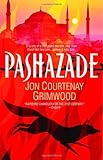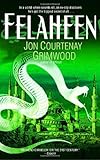
![]() ARABESK: Pashazade, Effendi and Felaheen
ARABESK: Pashazade, Effendi and Felaheen
In this review, I’m going to write about the willing suspension of disbelief. Perhaps more precisely, I’m writing about the intersection of world-building and the willing suspension of disbelief. Enter Jon Courtenay Grimwood and the ARABESK trilogy: Pashazade, Effendi and Felaheen.
In Grimwood’s world, the Ottoman Empire never collapsed. Woodrow Wilson brokered peace between London and Berlin in 1915, World War II never happened, and the major world powers seem to be Germany, France, the USA and the Empire. This alternate timeline stretches a few decades beyond current time, but in terms of fashion and technology, there’s nothing the science fiction reader won’t recognize. It’s the social, political and economic things that are different, and the murder of an impoverished but highly socially connected woman, who has made an enemy of one of the world powers, and introduced a complete stranger she claims is the secret son of the Emir of Tunis, strikes every single social, political and economic chord. And this is just the first book, Pashazade.
So how am I, in the first couple of chapters, supposed to assimilate this new world, and absorb the clues necessary to figure out who murdered the woman? Who will help me navigate this foreign reality? Well, there’s Felix: Felix the seriously overweight, disgraced ex-LA cop, now Chief of Detectives of the city of El Iskandryia; Felix, the Catholic in a city of Muslims, the not-so-secret drinker, the serious investigator, who dismisses the man he’s with as a “silksuit.” Those of us who read detective novels understand Felix immediately. I might not approve of Felix. I wouldn’t want him dating my daughter, and I certainly wouldn’t loan him my car, but if the nightclub were on fire, Felix is the one I would follow, because I know he would get me to safety. Felix is also an outsider in the city, an adapted outsider, so he knows what the newcomer, like me, needs to know right away to navigate this mysterious world.
 Felix, my host in the first chapter of Pashazade, is not a major character. Ashraf al-Mansur, or “Raf,” or “ZeeZee,” the silksuit Felix left standing in a doorway while he investigated the crime scene, is the main character. Raf, in the first half of the first book, is opaque to the reader, and largely opaque to himself. By Chapter Two the most compelling thing I know about him is that he talks to a fox that lives in his head. Yeah okay. Like Felix, I kind of like him in spite of myself, don’t quite trust him, and can’t figure him out. Grimwood has me right where he wants me.
Felix, my host in the first chapter of Pashazade, is not a major character. Ashraf al-Mansur, or “Raf,” or “ZeeZee,” the silksuit Felix left standing in a doorway while he investigated the crime scene, is the main character. Raf, in the first half of the first book, is opaque to the reader, and largely opaque to himself. By Chapter Two the most compelling thing I know about him is that he talks to a fox that lives in his head. Yeah okay. Like Felix, I kind of like him in spite of myself, don’t quite trust him, and can’t figure him out. Grimwood has me right where he wants me.
The overarching story of the three books is Raf’s search for his identity, both in a psychological, spiritual way and in the strict literal sense. Pashazade follows the search for the murderer of the woman who might have been Ashraf’s aunt. Effendi moves forward in time a couple of years, and concentrates on Raf’s father-in-law, on trial for war crimes. In Felaheen, the focus shifts to Raf’s adventurous and morally challenged mother Sally, but also unfolds the mystery of Raf’s existence.
 At the street level, so to speak, Raf is confused about who exactly his father is, since his mother always said he was a Swedish backpacker she took up with for a few days, and not the Emir. The bigger secret of Raf’s identity — not so much who he is as what he has been turned into — is murkier. The best theory about Raf’s existence is postulated by the isolated, rebellious, scary-smart nine-year-old girl Hana, who may be Raf’s niece. Raf, she decides, is a Son of Lilith, a djinn, and if he can disguise himself as a human for seven years, he will be allowed to become truly human.
At the street level, so to speak, Raf is confused about who exactly his father is, since his mother always said he was a Swedish backpacker she took up with for a few days, and not the Emir. The bigger secret of Raf’s identity — not so much who he is as what he has been turned into — is murkier. The best theory about Raf’s existence is postulated by the isolated, rebellious, scary-smart nine-year-old girl Hana, who may be Raf’s niece. Raf, she decides, is a Son of Lilith, a djinn, and if he can disguise himself as a human for seven years, he will be allowed to become truly human.
You mustn’t think from that assessment that Hana — or Hani, as she prefers — doesn’t like Raf. She does. One metric in the judging of Raf as a worthy or unworthy character is his treatment of Hani, and he treats her right. Her trust in him is well-placed, even when his actions seem to make no sense.
There’s still this different world to adjust to. Early in Pashazade, Grimwood gives us an info dump, as Raf has a discussion with his future father-in-law about his imaginary doctoral thesis concerning alternate timelines. What if Wilson hadn’t stopped World War I? What if the Empire had dissolved in 1923? Grimwood makes this entertaining by setting the conversation with someone who is completely, if quietly, shocked by these suggestions and thinks they border on treason. Hamzah Quitramala is completely a product of his culture, and he doesn’t indulge in this irreverent sort of fantasizing. This realistic foil to Raf’s hypotheticals — which are spelling out for the reader what did happen — makes this world more realistic. This abstract discussion gives us just enough to accept everything that happens in the rest of the series.
As I read the trilogy, it was the characters who swept me through the elaborate city and the harsh, beautiful landscapes. Whether it is Hani, who comes to realize just how much like her uncle she is; Zara, a rebellious and damaged daughter; the Khedive, the hereditary ruler, struggling at seventeen to find his own voice among the powerful older men who “counsel” and protect him; Avatar, pirate DJ and Zara’s illegitimate half-brother, or Raf himself, I cared enough about these people to stick with them through all three books. I turned the pages wondering what would happen next. What is Hani, exactly? Will Avatar be accepted by his father? Will Zara ever be happy? Will Raf survive? Even the story of Raf’s annoying mother Sally, who I never cared for, kept me turning the pages. And what about that fox?
And Felix? Felix, the only truly American voice in the book, is not a main character in any sense, but he becomes, in a way, Raf’s conscience and a mentor for Hani. His main mission, to introduce us to the strangeness, and then to stay with us until we are sure it’s safe, is executed perfectly.
So here’s one way to get the reader to suspend disbelief and enter your imaginary world; give them a tour guide they can trust.
Arabesk — (2001-2003) Publisher: Part mystery, part speculative fiction, and wholly unforgettable, Jon Courtenay Grimwood’s celebrated Arabesk series portrays the dark, hard-boiled story of a man out to prove his innocence in an alternate world where the facts aren’t always the same as the truth… and murder isn’t the worst that can happen. It’s a twenty-first century hauntingly familiar — and yet startlingly different from our own. Here the United States brokered a deal that ended World War I, and the Ottoman Empire never collapsed. And lording it over all sits the complex, seductive, and bloodthirsty North African metropolis of El Iskandryia. Almost nothing is what it seems to be in El Isk, and Ashraf Bey is no exception. Neither the rich Ottoman aristocrat everyone thinks he is, nor the minor street criminal once shipped off to prison when he fell foul of his Chinese Triad employers — the fact is that Raf has as little idea who he is as anyone else. With few clues and no money, all Raf has is a surname hinting at noble heritage and an arranged marriage to a woman who hates him. But nothing Ashraf al Mansur learns about himself is as unexpected — or as terrifying — as the brutal murder he’s accused of committing. Now, as a hunted man with the welfare of a precocious young girl in his irresponsible hands, Raf must race after a killer through an unforgiving city as foreign to him as the truth he’ll uncover about himself.






Do it! One of the best things I've read in recent years.
This reminds me. I want to read Addie LaRue.
We’re in total agreement David!
I felt just the same. The prose and character work was excellent. The larger story was unsatisfying, especially compared to…
Hmmm. I think I'll pass.